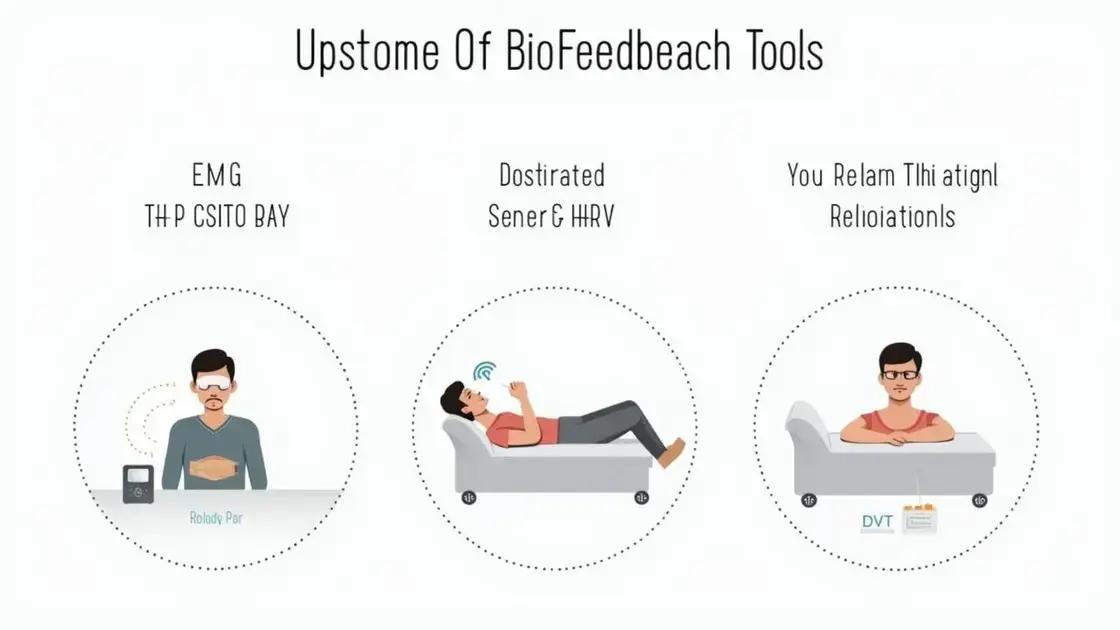Biofeedback tools are effective for optimizing stress management for men by helping them understand and control their physiological responses to stress through various techniques like breathing exercises, progressive muscle relaxation, and real-time data monitoring.
In today’s fast-paced world, managing stress effectively is crucial for mental well-being, especially for men. Biofeedback tools are emerging as innovative solutions that empower individuals to gain control over their physiological responses to stress. By utilizing these advanced tools, men can not only recognize their stress triggers but also understand how to mitigate their impact. In this article, we will delve into the basics of biofeedback, explore its benefits, share effective techniques, and highlight real-life success stories that demonstrate its transformative potential.
Understanding Biofeedback: Overview and Basics

Biofeedback is a technique that teaches individuals to control physiological processes by using signals from their own bodies. This practice helps in understanding how stress affects us and in managing it effectively. Essentially, biofeedback provides real-time data about bodily functions such as heart rate, muscle tension, and skin temperature, enabling men to respond to stress in healthier ways.
The Basics of Biofeedback
At its core, biofeedback involves the use of sensors placed on the body that monitor physiological signals. For example, sensors may track heart rate variability or muscle tightening during stressful situations. This data is then displayed on a screen, allowing users to visualize their stress responses. By recognizing these signals, men can learn to alter their reactions through techniques like relaxation and visualization.
Types of Biofeedback Tools
There are various types of biofeedback tools available today. Common types include:
- Electromyography (EMG): Measures muscle tension to help reduce stress.
- Thermal Biofeedback: Monitors skin temperature, which can indicate stress levels.
- Heart Rate Variability (HRV): Assesses heart rate patterns to improve emotional regulation.
Each of these tools provides unique insights, enabling men to choose the best type that suits their individual needs.
How Biofeedback Supports Stress Management
Biofeedback is beneficial because it empowers men to take control of their stress responses. Through consistent practice, users can develop better coping strategies. By learning to regulate breathing and muscle tension, they find they can reduce anxiety and improve overall well-being. This proactive approach not only enhances personal health but also fosters a greater sense of self-awareness.
Key Benefits of Biofeedback for Men

Biofeedback offers several key benefits for men, especially in managing stress and improving overall health. By using biofeedback tools, individuals can gain insights into how their bodies respond to stress, enabling them to make informed changes to their lifestyle.
Enhanced Self-Awareness
One of the primary benefits of biofeedback is increased self-awareness. Men learn to recognize their physical signs of stress, like increased heart rate or muscle tension. This awareness can help them identify triggers and respond more calmly in stressful situations.
Improved Relaxation Techniques
Biofeedback enables users to practice relaxation techniques effectively. Through guided sessions, men can learn how to reduce stress on their own. Techniques like deep breathing and progressive muscle relaxation become more effective as they receive real-time feedback from biofeedback devices.
Better Emotional Regulation
With consistent practice, biofeedback helps men improve their emotional regulation. They can learn to manage anxiety and anger more effectively. This emotional control leads to better decision-making and improved relationships, both personally and professionally.
Support for Mental Health
Biofeedback is also beneficial for mental health. Many men struggle with stress and anxiety, leading to mental health issues. Biofeedback can be part of a comprehensive treatment program, reducing symptoms of depression and anxiety through increased awareness and skills.
Enhanced Performance
Lastly, biofeedback can enhance performance in various areas of life. Whether in sports, work, or daily activities, the ability to manage stress effectively allows men to perform at their best. When stress is minimized, focus and productivity often improve.
Techniques in Biofeedback for Stress Management

Using biofeedback for stress management involves several effective techniques. These practices help men learn how to control their bodily responses to stressors and enhance their overall well-being.
1. Breathing Exercises
Deep breathing is one of the simplest and most powerful biofeedback techniques. By focusing on slow, deep breaths, men can lower their heart rate and reduce stress. Using biofeedback devices, they can see real-time changes in their heart rate as they breathe deeply.
2. Progressive Muscle Relaxation
This technique involves tensing and relaxing different muscle groups in the body. Men can use biofeedback to see how tension affects their heart rate and muscle activity. This awareness helps them learn how to release tension more effectively.
3. Meditation and Mindfulness
Incorporating meditation practices with biofeedback can enhance focus and relaxation. Men can monitor their brainwaves or heart rates and practice mindfulness to reach a calm state. By seeing their progress, they become more motivated to practice regularly.
4. Visualization Techniques
Using visualization, men can create mental images of calm and peaceful settings. Biofeedback helps them understand how these images affect their physiological state. This connection makes it easier to manage stress in real-life situations.
5. Heart Rate Variability Training
Heart rate variability (HRV) training focuses on improving the balance between the sympathetic and parasympathetic nervous systems. By using biofeedback, men learn to control their heart rate variability, which is linked to stress management and emotional regulation.
6. Neurofeedback
Neurofeedback involves training the brain to function better by monitoring brainwave activity. Men can learn to shift their brain patterns related to stress, leading to improved focus and emotional control. This advanced technique often requires specialized equipment and training but can be very effective.
Real-Life Success Stories with Biofeedback Tools

Many men have found success in managing stress through the use of biofeedback tools. These real-life stories showcase how effective these techniques can be in improving mental health and overall quality of life.
Case Study: Mark’s Journey with Anxiety
Mark, a 35-year-old accountant, struggled with workplace anxiety. After trying various methods with little success, he discovered biofeedback. Using a heart rate monitor, he learned to control his breathing and heart rate during stressful moments. Within weeks, Mark reported feeling more in control and less anxious at work. He credits biofeedback for changing his approach to stress management.
Success Story: Tom and Sleep Issues
Tom, a 42-year-old father, faced chronic sleep problems due to stress. After researching, he tried a combination of neurofeedback and relaxation techniques. With regular sessions, he was able to identify the physical signs of stress that disrupted his sleep. After a few months, Tom enjoyed deeper, more restful sleep, which improved his overall well-being.
Client Testimonial: David’s Athletic Performance
David, a 28-year-old athlete, utilized biofeedback to enhance his performance in competitive sports. By using HRV biofeedback, he learned to regulate his heart rate during training and competitions. This control reduced his anxiety before events, allowing him to focus better and achieve personal bests. David’s story highlights how biofeedback can not only help with stress but also optimize performance.
Transformative Experience: Mike’s Mental Clarity
Mike, a 50-year-old business owner, was feeling overwhelmed by daily responsibilities. Seeking a solution, he turned to biofeedback. Through regular sessions, Mike learned techniques to calm his mind and reduce stress. As a result, he experienced improved mental clarity, which led to better decision-making in his business. He believes biofeedback was key to regaining balance in his life.
Unlocking the Power of Biofeedback for Stress Management
Utilizing biofeedback tools can significantly enhance stress management for men. By understanding how their bodies respond to stress, individuals like Mark, Tom, David, and Mike have transformed their lives.
From improved emotional regulation and mental clarity to better athletic performance, the benefits of biofeedback are substantial. These techniques empower men to take control of their stress responses and promote overall well-being.
As more men discover the advantages of biofeedback, it is clear that these tools can be key in optimizing mental health and transforming personal and professional lives.
For anyone seeking effective stress management solutions, biofeedback could be the innovative approach needed to foster resilience and enhance quality of life.
FAQ – Frequently Asked Questions about Biofeedback for Stress Management
What is biofeedback?
Biofeedback is a technique that teaches individuals to control physiological processes by using real-time feedback from their body.
How can biofeedback help with stress management?
Biofeedback helps individuals recognize their body’s stress responses, allowing them to learn techniques to manage and reduce stress effectively.
What techniques are commonly used in biofeedback?
Common techniques include breathing exercises, progressive muscle relaxation, meditation, visualization, heart rate variability training, and neurofeedback.
Are there real-life success stories of biofeedback users?
Yes, many individuals have successfully managed their stress and improved their well-being through biofeedback, reporting significant changes in anxiety, sleep quality, and performance.
Is biofeedback suitable for everyone?
While biofeedback can benefit many people, results may vary. It’s recommended to consult with a healthcare professional to see if it’s the right choice for you.
What equipment is needed for biofeedback?
Biofeedback can be practiced using various devices such as heart rate monitors, electromyography (EMG) sensors, and neurofeedback equipment.













